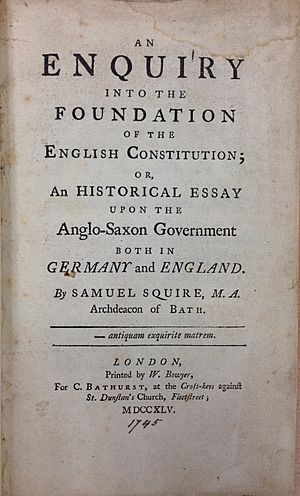Samuel Squire facts for kids
Quick facts for kids
Samuel Squire
|
|
|---|---|
| Born | 1714 |
| Died | 4 November 1764 (aged 49–50) Harley Street, Westminster
|
| Nationality | English |
| Education | Lord Weymouth's Grammar School, St John's College, Cambridge (1730) |
| Occupation | Bishop, Pamphleteer and historian |
Samuel Squire (born in 1714, died in 1766) was an important person in the Church of England. He was a Bishop, which is a high-ranking church leader. He was also a historian, meaning he studied and wrote about the past.
Contents
Samuel Squire: A Life of Learning and Leadership
Early Life and Education
Samuel Squire grew up in Warminster, a town in Wiltshire, England. His father was a druggist, which was like a pharmacist back then. Samuel first went to Lord Weymouth's Grammar School.
In 1730, he started studying at St John's College, Cambridge University. He earned his first degree (BA) in 1734. That same year, he won a special award called the Craven scholarship. He became a fellow at St John's in 1735. Later, he earned his MA degree in 1737 and became a Doctor of Divinity in 1749.
Church Career and Promotions
Squire began his work in the church in 1739 when he became a deacon. He was made a priest in 1741. In the same year, he became the vicar of Minting, a church in Lincolnshire.
His career quickly advanced. In 1743, he became a canon at Wells Cathedral and an Archdeacon of Bath. He held both these important positions until 1761. He also took on more church roles. He was the rector of Toppesfield, Essex, from 1749 to 1750. Then he became rector of St Anne's Church, Soho (1750–1766) and vicar of St Alphege's, Greenwich (1751–1766). A famous thinker named William Paley worked for him there.
Squire briefly served as the Dean of Bristol in 1760. Finally, in 1761, he was appointed Bishop of St David's. He gained these high positions because he openly supported the court Whigs. The Whigs were a major political group in Britain at the time. He was also a chaplain to the Duke of Newcastle, a powerful leader known for helping his political allies get jobs.
Published Works and Political Views
In the 1740s, Samuel Squire wrote five essays about politics. In these writings, he showed his strong support for the Whig party.
- In his book Letter to a Young Gentleman of Distinction (1740), he argued that a standing army was better than a local militia for protecting Britain. This was important during wars with France and Spain.
- In The Important Question Discussed (1746), he supported sending British troops to fight in Europe.
- He also defended the Whig government led by Henry Pelham in A Letter to a Tory Friend (1746).
Squire also disagreed with the historian Thomas Carte, who supported the Jacobite cause (trying to bring back the old royal family, the House of Stuart). Squire wrote two pamphlets in 1748: Remarks upon Mr. Carte's Specimen and A Letter to John Trot-Plaid. In Remarks, Squire used ideas about natural law to argue against Carte's views. In A Letter, he made fun of Carte's way of looking at history.
Writings on English History
Squire also published two important books on English history:
- An Enquiry into the Foundation of the English Constitution (1745)
- Historical Essay upon the Balance of Civil Power in England (1748)
In An Enquiry, Squire wrote about how the early German and Anglo-Saxon people loved freedom and fair government. In his Historical Essay, he explained that freedom depends on a balance of power among different groups in society. He believed that if this balance breaks down, a government can become unfair. He thought that the Glorious Revolution of 1688 had finally created this balance, making sure people had liberty.
In May 1746, Samuel Squire was chosen to be a Fellow of the Royal Society. This is a very respected group for scientists and thinkers. He was recognized for his valuable writings, including essays on ancient Greek history and language. He also published a new edition of a work by Plutarch.
Samuel Squire passed away in Harley Street, Westminster.
 | Misty Copeland |
 | Raven Wilkinson |
 | Debra Austin |
 | Aesha Ash |


